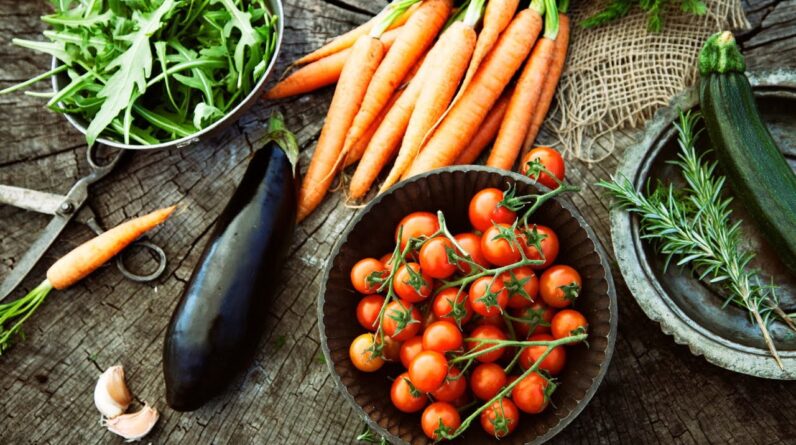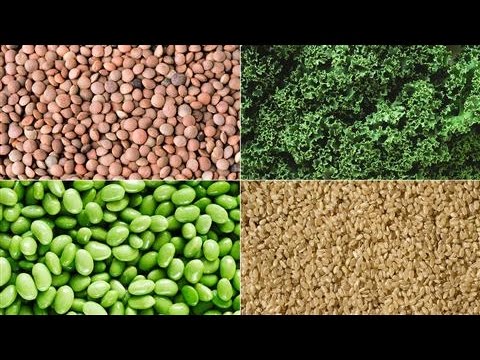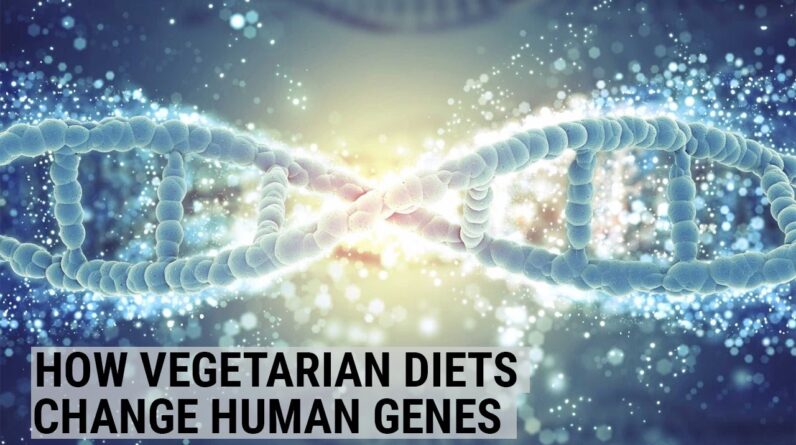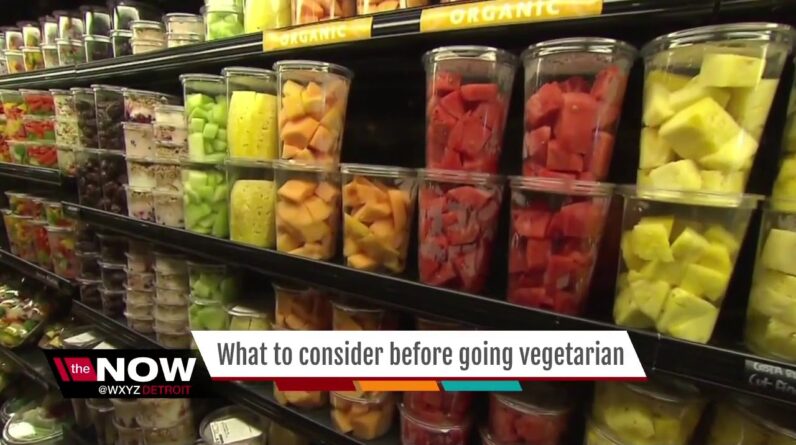
Are you thinking about trying a vegetarian diet but feeling unsure about where to start? The idea of giving up meat may seem scary or overwhelming, but a vegetarian diet doesn’t mean you can never enjoy delicious food again. Julia Zumpano, a registered dietitian from the Cleveland Clinic, explains that a vegetarian diet primarily consists of plant-based foods, with some variations allowing for fish or dairy products. Incorporating a vegetarian diet into your lifestyle offers numerous benefits, including reduced saturated fat intake and increased fiber consumption. To begin your vegetarian journey, it’s best to start with small steps such as going meatless for one meal a week or gradually increasing the number of meatless meals. Remember to include a source of protein, such as beans, lentils, tofu, or dairy products, to ensure that your meals remain balanced and nutritious. Even if you don’t eliminate meat entirely, adding more meatless options to your diet can still have a positive impact on your health. So, why not give it a try and see how delicious and satisfying a vegetarian diet can be?
Transitioning to a vegetarian diet can be a big change, but with the right approach, it doesn’t have to feel overwhelming. As Julia Zumpano explains, starting slowly and gradually increasing the number of meatless meals can help ease the transition. Begin by going meatless for at least one meal a week, and then expand from there. Make sure to include a source of protein in your meatless meals, such as beans, legumes, tofu, eggs, or dairy products, to ensure you’re still getting the necessary nutrients. Remember that vegetables are essential for any diet and can add flavor, variety, and nutrition to your meals. Vegetarian diets have been proven to be healthy, lower in saturated fat, higher in fiber, and even supportive of weight loss and diabetes control. So, why not take the first step towards incorporating more meatless meals into your diet and embrace the benefits that come with a vegetarian lifestyle?
Benefits of a Vegetarian Diet
A vegetarian diet offers several benefits to your health and overall well-being. By choosing a plant-based diet, you can experience the following advantages:
Lower in saturated fat
One of the main health benefits of a vegetarian diet is its lower saturated fat content. Unlike a diet that includes meat and animal products, a vegetarian diet focuses on plant-based foods, which are naturally low in saturated fat. This makes it a heart-healthy choice, as high intake of saturated fat has been linked to an increased risk of heart disease. By reducing your saturated fat intake, you can improve your cardiovascular health and lower your risk of developing heart-related conditions.
Higher in fiber
Another advantage of a vegetarian diet is its higher fiber content. Fiber is essential for maintaining a healthy digestive system and preventing digestive issues such as constipation. It also promotes regular bowel movements and can help you feel fuller for longer, making it beneficial for weight management. By increasing your fiber intake through a plant-based diet, you can support your overall digestive health and reduce the risk of developing conditions like diverticulitis and colorectal cancer.
Supportive to weight loss
If weight loss is a goal of yours, a vegetarian diet can be an excellent choice. Plant-based foods are generally lower in calories compared to meat and animal products. By incorporating more fruits, vegetables, whole grains, and legumes into your meals, you can reduce your overall calorie intake and create a calorie deficit, which is necessary for weight loss. Additionally, the high fiber content of plant-based foods can help control your appetite and prevent overeating, further supporting your weight loss journey.
Can help control diabetes
For individuals with diabetes or those concerned about preventing the condition, a vegetarian diet can be beneficial. Studies have shown that adopting a plant-based diet can improve blood sugar control and insulin sensitivity in both individuals with type 2 diabetes and those at risk of developing the condition. By focusing on whole grains, legumes, fruits, and vegetables, which have a low glycemic index, you can regulate your blood sugar levels and reduce the need for insulin medication. A vegetarian diet can also aid in weight management, which is crucial for diabetes prevention and management.
Getting Started with a Vegetarian Diet
Embarking on a vegetarian diet may seem overwhelming at first, but with some simple steps, you can make the transition smooth and enjoyable. Here are some tips to help you get started:
Start with one meatless meal a week
If you’re new to vegetarianism, a great way to start is by going meatless for one meal a week. Choose a day to try out a fully plant-based meal and experiment with different recipes and ingredients. This gradual approach allows you to ease into the change without feeling overwhelmed.
Gradually increase the number of meatless meals
Once you’re comfortable with one meatless meal a week, gradually increase the number of meatless meals in your diet. Aim to have two or three meatless meals per week, and then continue to add more as you feel ready. This approach allows your taste buds and digestion to adjust to the new dietary changes slowly.
Include a source of protein with each meal
When adopting a vegetarian diet, it’s important to ensure you’re getting an adequate amount of protein. Include a source of protein with each meal, such as beans, legumes, lentils, tofu, eggs (if you choose to include them), Greek yogurt, or cheese. These protein-rich foods will not only help you meet your nutritional needs but also keep you feeling satisfied and full.
Incorporate vegetables into your diet
Vegetables play a crucial role in a vegetarian diet, providing essential vitamins, minerals, and fiber. Make sure to incorporate a variety of vegetables into your meals to reap their nutritional benefits fully. Experiment with different cooking methods and seasoning to make your vegetable dishes flavorful and exciting. Remember, the more colorful and diverse your vegetable choices, the more nutritional variety you’ll receive.
Transitioning to a Vegetarian Diet
Transitioning to a vegetarian diet is a personal journey, and it’s essential to find an approach that works best for you. Here are some tips to help you transition smoothly and sustainably:
Gradually increase the number of meatless meals per week
As you become more comfortable with meatless meals, aim to increase the number of vegetarian meals you have each week. Set achievable goals, such as having four meatless dinners each week or incorporating a meatless lunch into your routine. This gradual increase will allow your body and taste buds to adjust slowly, making the transition easier.
Include meat for special occasions
You don’t have to completely eliminate meat from your diet if you don’t want to. To make the transition less daunting, consider including meat for special occasions or social gatherings. By reserving meat for specific situations, you can still enjoy the foods you love while embracing a predominantly plant-based lifestyle.
Focus on incorporating more meatless meals rather than avoiding an entire food group
Instead of solely focusing on what you’re avoiding, concentrate on incorporating more meatless meals and exploring new vegetarian recipes. Embrace the opportunity to discover exciting plant-based ingredients and flavors. By shifting your mindset towards adding more vegetarian options rather than restricting yourself, you’ll find the transition to be more enjoyable and sustainable in the long run.

This image is property of i.ytimg.com.
Sources of Plant-Based Protein
Protein is an essential nutrient for maintaining muscle mass, supporting healthy tissue growth, and aiding in various bodily functions. While many people associate protein with meat and animal products, there are plenty of plant-based sources that can meet your protein needs. Here are some excellent sources of plant-based protein:
Beans and legumes
Beans and legumes, such as chickpeas, black beans, lentils, and kidney beans, are rich in protein. They are versatile ingredients that can be used to create satisfying meals like soups, stews, salads, and dips. Incorporate them into your diet regularly to enjoy their protein content and numerous health benefits.
Lentils
Lentils are a fantastic source of plant-based protein, offering approximately 18 grams of protein per cooked cup. They are also high in fiber, iron, and folate, making them a nutritionally dense food. Use lentils in soups, curries, and salads to add a protein punch to your meals.
Tofu
Tofu, made from soybeans, is a popular plant-based protein source. It is versatile, taking on the flavors of the ingredients it is cooked with. With approximately 10 grams of protein per half-cup, tofu can be used in stir-fries, scrambles, and even desserts.
Bean-based burgers
Bean-based burgers, whether homemade or store-bought, are an excellent alternative to traditional meat burgers. They are typically made from beans, lentils, or a combination of different legumes, providing a good amount of plant-based protein. Try them in a whole grain bun with your favorite toppings for a delicious and protein-rich meal.
Egg whites (in moderation)
If you choose to include eggs in your vegetarian diet, egg whites are an excellent source of protein. They are low in calories and fat, making them a healthy and versatile addition to vegetarian meals. Use egg whites in omelets, frittatas, or baking recipes to boost your protein intake.
Greek yogurt
Greek yogurt is a dairy product that can be a valuable source of protein in a vegetarian diet. It contains about 17 grams of protein per serving, along with beneficial probiotics that support gut health. Enjoy Greek yogurt on its own or use it as a base for smoothies, parfaits, or salad dressings.
Cottage cheese
Cottage cheese is another dairy-based product that provides a good amount of protein. It contains approximately 14 grams of protein per half-cup serving. Cottage cheese can be enjoyed on its own, mixed with fruits for a snack, or used as a topping for salads or baked goods.
Low-fat cheese
Low-fat cheese, such as mozzarella or Swiss, can be an excellent source of protein in moderation. It is lower in fat and calories compared to full-fat cheese while still providing a good amount of protein. Use low-fat cheese in sandwiches, wraps, or as a topping for soups or casseroles.
Remember to choose a variety of protein sources in your vegetarian diet to ensure you’re getting a wide range of essential amino acids and other nutrients.
The Importance of Vegetables
Vegetables play a crucial role in a vegetarian diet, providing a wealth of vitamins, minerals, fiber, and antioxidants. Here are some reasons why vegetables are important and should be a staple in your vegetarian meal plans:
Provide vitamins and minerals
Vegetables are an excellent source of various vitamins and minerals necessary for optimum health. They are especially rich in vitamins A, C, and K, as well as folate, potassium, and magnesium. These nutrients are essential for supporting immunity, maintaining healthy skin, promoting bone health, and regulating various bodily functions.
High in fiber
Fiber is essential for maintaining a healthy digestive system. Vegetables, especially when consumed in their whole and unprocessed form, are high in dietary fiber. Fiber helps promote regular bowel movements, prevent constipation, and support a healthy gut microbiome. By including a variety of vegetables in your diet, you can ensure you’re getting an ample amount of fiber to support your digestive health.
Low in calories
Many vegetables are low in calories, making them an excellent choice for weight management. They provide essential nutrients without adding excessive calories to your diet. By incorporating more vegetables into your meals, you can increase the volume of your meals, feel fuller for longer, and reduce the overall calorie density of your diet.
Add flavor and variety to meals
Vegetables add flavor, texture, and visual appeal to meals, making them more enjoyable and satisfying. They can be prepared in various ways, such as roasted, steamed, sautéed, or grilled, allowing you to experiment with different cooking techniques and flavors. By incorporating a variety of vegetables into your meals, you can create exciting and nutritious dishes.
Nutritionally beneficial
Vegetables are nutritionally dense, meaning they provide a high amount of nutrients and essential compounds with few calories. They are packed with antioxidants, which help protect your body against oxidative stress and reduce the risk of chronic diseases. Regular consumption of vegetables has been linked to lower blood pressure, improved heart health, and reduced inflammation.
By making vegetables a prominent part of your vegetarian diet, you can ensure you’re getting a wide range of vital nutrients while enjoying flavorful and satisfying meals.
Finding Vegetarian Alternatives
As you transition to a vegetarian diet, it’s essential to find suitable alternatives to replace meat and animal products. Here are some tips to help you discover delicious vegetarian alternatives:
Explore meatless recipes
There are countless meatless recipes available online and in cookbooks to help you create delicious and satisfying vegetarian meals. Take the time to explore different recipes and experiment with new ingredients and flavors. From hearty soups and stews to flavorful stir-fries and grain bowls, there are endless possibilities to enjoy a variety of vegetarian meals.
Discover vegetarian meal options at restaurants
Eating out doesn’t have to be a challenge when following a vegetarian diet. Many restaurants now offer vegetarian options, and some even have dedicated vegetarian or plant-based menus. By exploring different restaurants and cuisines, you can discover exciting vegetarian dishes that you can enjoy while dining out.
Experiment with plant-based substitutes for meat
Plant-based meat substitutes, such as tofu, tempeh, and seitan, have become increasingly popular and widely available. These products mimic the taste and texture of meat, making them suitable replacements in your favorite recipes. Experiment with different plant-based protein options to find the ones you enjoy the most and incorporate them into your meals.
Try new ingredients and cooking techniques
The world of vegetarian cooking offers a wide array of ingredients and cooking techniques to explore. From exotic spices and grains to unfamiliar vegetables and legumes, there are endless possibilities to enhance your culinary skills and broaden your palate. Be open to trying new ingredients and experimenting with different cooking techniques to add variety and excitement to your vegetarian meals.
By being open-minded and willing to step out of your culinary comfort zone, you can discover a whole new world of delicious vegetarian alternatives.
Easing into a Vegetarian Lifestyle
Transitioning to a vegetarian lifestyle can be a significant change, and it’s essential to approach it with realistic goals and expectations. Here are some tips to help you ease into a vegetarian lifestyle:
Educate yourself about vegetarianism
Before fully committing to a vegetarian lifestyle, take the time to educate yourself about the principles, benefits, and potential challenges of vegetarianism. Learn about the different types of vegetarian diets, the nutritional considerations, and the environmental impact of your food choices. This knowledge will help you make informed decisions and feel more confident in your vegetarian journey.
Join online communities or support groups
Connecting with others who share your interest in vegetarianism can be both motivating and informative. Join online communities or support groups where you can seek support, share experiences, and exchange recipe ideas. These communities can provide valuable advice, encouragement, and resources to help you stay committed to your vegetarian lifestyle.
Seek guidance from a registered dietitian
If you’re unsure about meeting your nutritional needs on a vegetarian diet, consider consulting a registered dietitian who specializes in vegetarian nutrition. A dietitian can guide you in creating a well-balanced vegetarian meal plan that meets your unique needs and preferences. They can provide personalized advice on protein sources, nutrient intake, and overall dietary strategies to ensure your vegetarian diet is nutritionally adequate.
Set realistic goals and expectations
It’s essential to set realistic goals and expectations when transitioning to a vegetarian lifestyle. Understand that this is a journey and that change takes time. Start by gradually incorporating more meatless meals into your diet and be patient with yourself as you learn new cooking techniques and explore different ingredients. Celebrate your progress and acknowledge that every small step towards a vegetarian lifestyle is a positive one.
By taking an informed and gradual approach, you can ease into a vegetarian lifestyle while ensuring you meet your nutritional needs and embrace the benefits of a plant-based diet.
Making Sustainability a Priority
In addition to personal health benefits, adopting a vegetarian diet can also contribute to the sustainability of our planet. By making conscious choices about the food we consume, we can help minimize our environmental impact. Here are some ways to make sustainability a priority in your vegetarian lifestyle:
Understand the environmental benefits of a vegetarian diet
Animal agriculture is a significant contributor to greenhouse gas emissions, deforestation, and water pollution. By reducing our consumption of animal products, we can reduce our carbon footprint and help combat climate change. Educate yourself about the environmental impact of animal agriculture to better understand the positive role a vegetarian diet can play in sustainability.
Choose locally-sourced and organic produce
Support local farmers and reduce the carbon footprint associated with transportation by choosing locally-sourced produce whenever possible. Organic farming methods minimize the use of harmful pesticides and promote soil health, contributing to the sustainability of our soil and water systems. By prioritizing locally-sourced and organic produce, you can support sustainable farming practices.
Reduce food waste
Food waste is a significant issue worldwide, contributing to greenhouse gas emissions and resource depletion. Embrace a zero-waste mindset by planning your meals, buying only what you need, and making use of leftovers. Get creative with repurposing ingredients and freezing excess produce to reduce waste and minimize your impact on the environment.
Support ethical and sustainable farming practices
When choosing dairy and egg products, opt for those sourced from ethical and sustainable farming practices. Look for certifications such as organic, free-range, and pasture-raised, which indicate higher animal welfare and environmentally-friendly practices. By supporting companies that prioritize these values, you contribute to a more sustainable food system.
By making sustainability a priority in your vegetarian lifestyle, you can align your dietary choices with your values and contribute to the well-being of our planet.
Overcoming Challenges
While a vegetarian diet offers numerous benefits, it can come with its own set of challenges. Here are some strategies for overcoming common obstacles encountered on a vegetarian journey:
Dealing with social situations
Eating out or attending social gatherings can pose challenges for vegetarians, especially if vegetarian options are limited. To navigate social situations, communicate your dietary needs to your friends, family, or restaurant staff in advance. Offer to bring a vegetarian dish to potlucks and family gatherings to ensure there’s something suitable for you to enjoy.
Navigating dining out
When dining out, research vegetarian-friendly restaurants or ones that offer plant-based menu options in your area. Many establishments now have dedicated vegetarian or vegan menus, making it easier to find suitable options. You can also modify non-vegetarian dishes by requesting meatless substitutions or asking for certain ingredients to be removed.
Addressing nutrient concerns
Some individuals worry about meeting their nutrient needs on a vegetarian diet, particularly regarding protein, iron, calcium, and vitamin B12. However, by following a well-planned and varied vegetarian diet, you can easily meet these requirements. Consult a registered dietitian for personalized advice and consider taking appropriate supplements, such as B12, if necessary.
Finding vegetarian-friendly travel options
When traveling, finding vegetarian-friendly food options can be a challenge, especially in certain regions or countries. Prioritize researching local cuisine and identifying vegetarian-friendly restaurants or markets in advance. Pack vegetarian snacks for emergencies and be open to exploring new plant-based dishes unique to the region you’re visiting.
By being proactive and prepared, you can overcome challenges and enjoy a successful vegetarian lifestyle.
Conclusion
Embracing a vegetarian diet offers numerous health benefits, including lower saturated fat intake, increased fiber consumption, and the potential for weight loss and diabetes control. Getting started with a vegetarian lifestyle can be as simple as incorporating one meatless meal a week and gradually increasing the number of meatless meals you consume. Remember to include a source of protein with each meal and prioritize the consumption of vegetables for their nutritional value. As you transition to a vegetarian diet, explore different plant-based protein sources, experiment with new recipes, and support sustainable farming practices. Educate yourself about the benefits of vegetarianism, seek guidance from professionals, and set realistic goals and expectations. Overcome challenges by finding vegetarian alternatives, connecting with like-minded individuals, and prioritizing sustainability in your choices. By embracing a vegetarian lifestyle, you can improve your health, contribute to a more sustainable food system, and discover a whole new world of delicious and nutritious meals.






